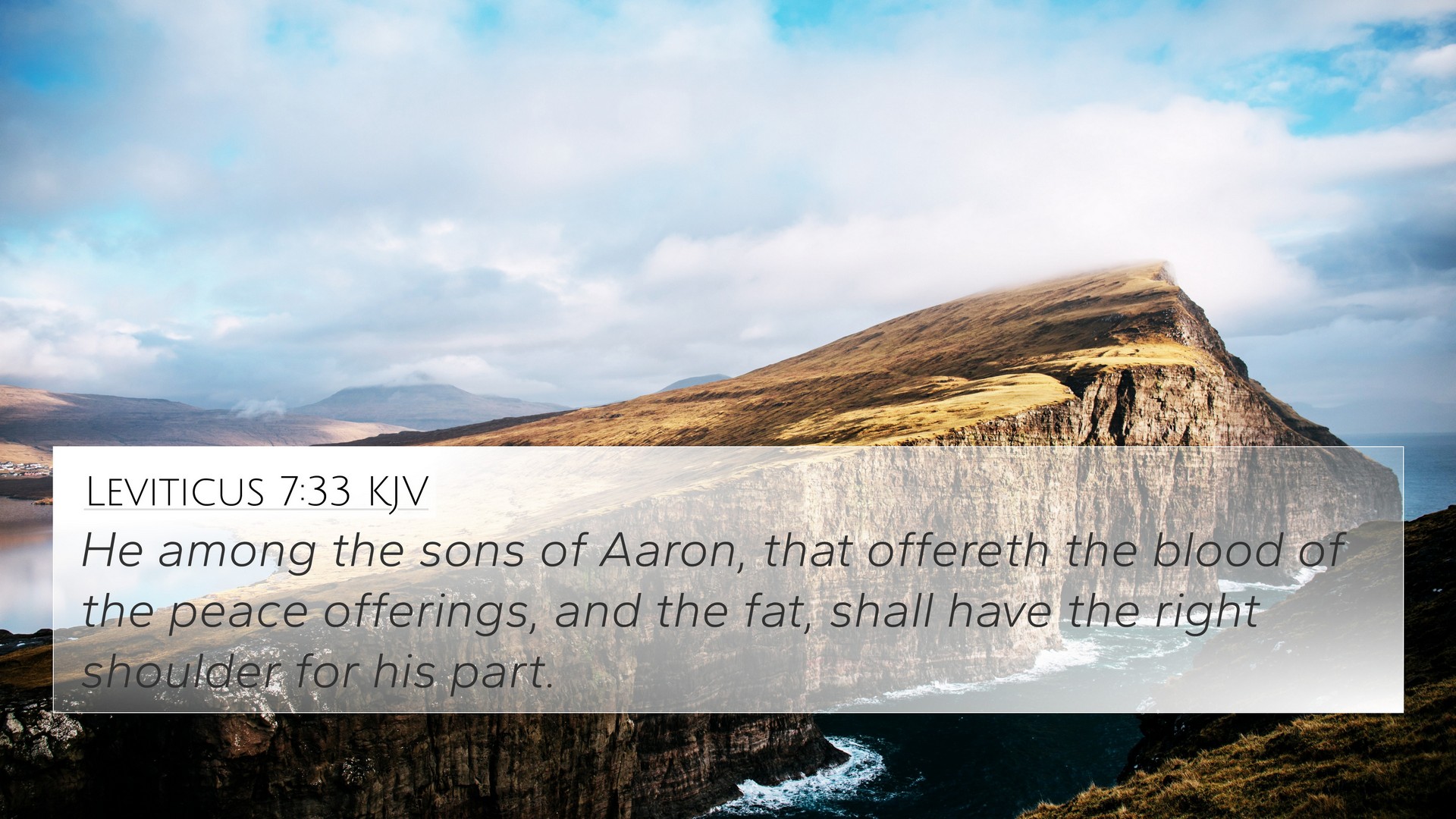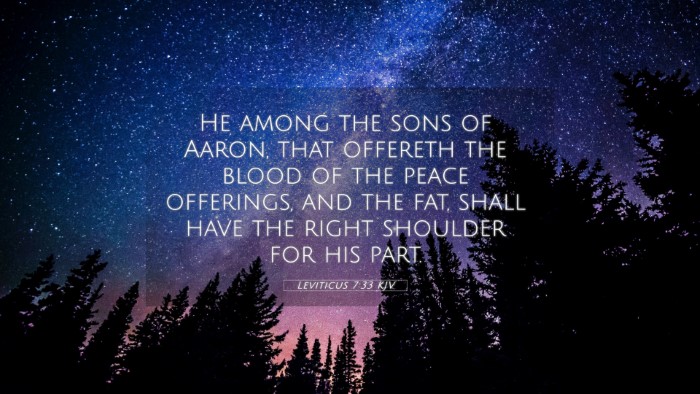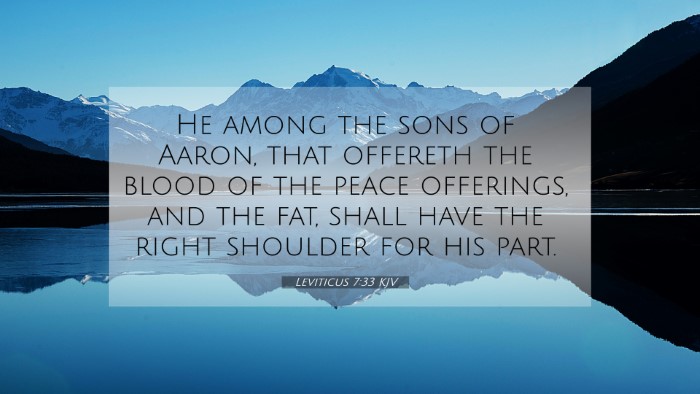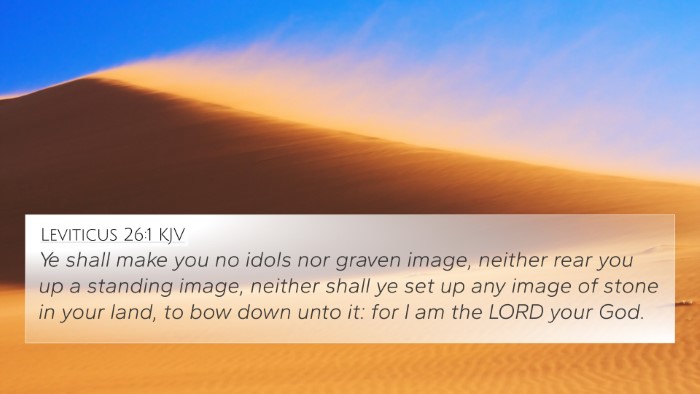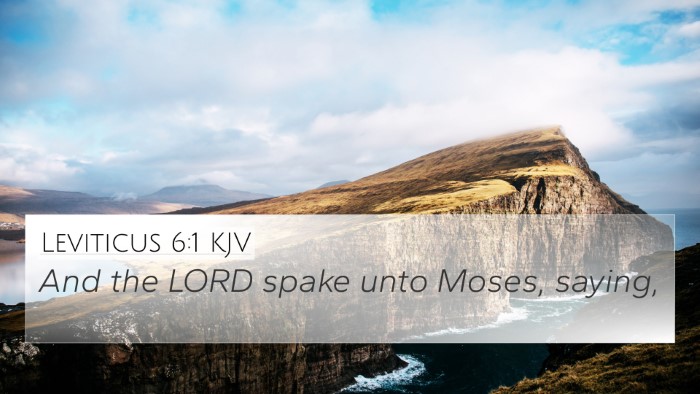Understanding Leviticus 7:33
Leviticus 7:33 reads: “The one of Aaron's sons who offers the blood of the fellowship offering and the fat shall have the right thigh as his share.” This verse highlights specific regulations regarding the division of sacrifices, which is crucial for understanding the priestly duties and the significance of offerings in the worship practices of ancient Israel.
Commentary Insights
According to Matthew Henry, this provision illustrates the honor and the physical sustenance afforded to the priests from the sacrifices made by the people. It emphasizes the role of the priesthood in mediating between God and the people, highlighting their vital function in worship.
Albert Barnes elaborates that the sharing of the thigh symbolizes the priests' legitimate right to partake in the offerings brought by the people. This is an acknowledgment of their service to God and the community, serving both a spiritual and practical purpose.
Adam Clarke notes that this sharing mechanism not only supports the priests materially but also reinforces communal participation in sacrificial rituals. It ensures that the priests are cared for and sanctified, reflecting God's provision for those who serve Him faithfully.
Theological Significance
- Priestly Authority: The allocation of the thigh as a share highlights the authority and honor bestowed upon the priests in their service to God.
- Provision for God’s Servants: It signifies God's care and provision for those dedicated to His service, ensuring they are not left wanting.
- Communal Worship: The shared offerings play a crucial role in fostering communal worship and solidarity among the Israelites.
Cross-Referencing Related Bible Verses
To fully appreciate the meaning of Leviticus 7:33, it is useful to cross-reference with other Bible verses that provide context and deepen understanding:
- Exodus 29:27-28: Discusses the holy portions of sacrifices for priests.
- Leviticus 3:5: Explains the burning of the fat with the sacrifices and its spiritual significance.
- Leviticus 10:14: Compels priests to partake in offerings as part of their duties.
- Numbers 18:11: Emphasizes the portions given to priests from the sacrificial offerings.
- Deuteronomy 18:3: States the rights of priests regarding their share in the offerings.
- Hebrews 7:14: Highlights the priestly lineage of Jesus, linking the Old Testament practices with the New Covenant.
- Matthew 10:10: Points out the ongoing divine provision for workers in the ministry.
- 1 Corinthians 9:13-14: Discusses the legitimacy of the apostles receiving support from the church akin to Old Testament priests.
- 1 Timothy 5:17-18: Describes the honor due to elders who rule well, reinforcing the theme of provision for spiritual leaders.
- Romans 15:27: Mentions the participation of the Gentiles in the spiritual blessings of Judaism.
Connections Between Bible Verses
Thematic Bible verse connections allow for deeper insights into Leviticus 7:33, linking the provisions for earthly priests with the ultimate high priest, Jesus Christ. Such cross-referencing highlights God’s continuous design throughout scripture for worship, provision, and community.
Conclusion
Leviticus 7:33 serves as a vital verse reflecting God's design for worship, sacrificial offerings, and the role of the priesthood. By exploring the interconnected scriptures, one can appreciate the continuity of God's plans across the Testaments, providing a rich narrative thread for study and reflection.
For those seeking to deepen their understanding of such connections, tools for Bible cross-referencing, including a Bible concordance or cross-reference guide, can facilitate a comprehensive study of the scriptures. Understanding these connections not only enriches one’s personal faith but also enhances communal theological discussions.
